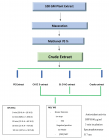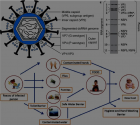Abstract
Review Article
COVID-19 detection and classification: key AI challenges and recommendations for the way forward
Albatoul Althinyan*, Abdulrahman Mirza, Sherin Aly, Thamer Nouh, Bassam Mahboub, Laila Salameh, Metab Alkubeyyer and Shada A AlSalamah
Published: 25 May, 2023 | Volume 7 - Issue 1 | Pages: 010-014
Coronavirus disease (COVID-19) is a viral pneumonia that is found in China and has spread globally. Early diagnosis is important for effective and timely treatment. Thus, many ongoing studies attempt to solve key COVID-19 problems such as workload classification, detection, and differentiation from other pneumonia and healthy lungs using different imaging modalities. Researchers have identified some limitations in the deployment of deep learning methods to detect COVID-19, but there are still unmet challenges to be addressed. The use of binary classifiers or building classifiers based on only a few classes is some of the limitations that most of the existing research on the COVID-19 classification problem suffers from. Additionally, most prior studies have focused on model or ensemble models that depend on a flat single-feature imaging modality without using any clinical information or benefiting from the hierarchical structure of pneumonia, which leads to clinical challenges, and evaluated their systems using a small public dataset. Additionally, reliance on diagnostic processes based on CT as the main imaging modality, ignoring chest X-rays. Radiologists, computer scientists, and physicians all need to come to an understanding of these interdisciplinary issues. This article first highlights the challenges of deep learning deployment for COVID-19 detection using a literature review and document analysis. Second, it provides six key recommendations that could assist future researchers in this field in improving the diagnostic process for COVID-19. However, there is a need for a collective effort from all of them to consider the provided recommendations to effectively solve these issues.
Read Full Article HTML DOI: 10.29328/journal.jprr.1001044 Cite this Article Read Full Article PDF
Keywords:
Artificial intelligence; COVID-19; CXR; CT-scan; Deep learning; Diagnosis; Image classification; Multi-classes; Pneumonia
References
- World Health Organization. (n.d.). Who coronavirus (COVID-19) dashboard. World Health Organization. https://covid19.who.int/
- Maharjan N, Thapa N, Pun Magar B, Maharjan M, Tu J. COVID-19 Diagnosed by Real-Time Reverse Transcriptase-Polymerase Chain Reaction in Nasopharyngeal Specimens of Suspected Cases in a Tertiary Care Center: A Descriptive Cross-sectional Study. JNMA J Nepal Med Assoc. 2021 May 25;59(237):464-467. doi: 10.31729/jnma.5383. PMID: 34508439; PMCID: PMC8673449.
- Swapnarekha H, Behera HS, Nayak J, Naik B. Role of intelligent computing in COVID-19 prognosis: A state-of-the-art review. Chaos Solitons Fractals. 2020 Sep;138:109947. doi: 10.1016/j.chaos.2020.109947. Epub 2020 May 29. PMID: 32836916; PMCID: PMC7256553.
- Khorasani A, Chegini A, Mirzaei A. New Insight into Laboratory Tests and Imaging Modalities for Fast and Accurate Diagnosis of COVID-19: Alternative Suggestions for Routine RT-PCR and CT-A Literature Review. Can Respir J. 2020 Nov 28;2020:4648307. doi: 10.1155/2020/4648307. PMID: 33354252; PMCID: PMC7737466.
- Yang T, Wang YC, Shen CF, Cheng CM. Point-of-Care RNA-Based Diagnostic Device for COVID-19. Diagnostics (Basel). 2020 Mar 18;10(3):165. doi: 10.3390/diagnostics10030165. PMID: 32197339; PMCID: PMC7151043.
- Health IT Analytics. (2018, November 5). Top 5 use cases for artificial intelligence in medical imaging. Health IT Analytics. https://healthitanalytics.com/news/top-5-use-cases-for-artificial-intelligence-in-medical-imaging
- Roberts M, Driggs D, Thorpe M, Gilbey J, Yeung M, Ursprung S, Aviles-Rivero AI, Etmann C, McCague C, Beer L, Weir-McCall JR, Teng Z, Gkrania-Klotsas E, Ruggiero A, Korhonen A, Jefferson E, Ako E, Langs G, Gozaliasl G, Schönlieb CB. Common pitfalls and recommendations for using machine learning to detect and prognosticate for covid-19 using chest radiographs and CT scans. Nature Machine Intelligence. 2021; 3(3): 199–217. https://doi.org/10.1038/s42256-021-00307-0
- Mahboub B, Tadepalli M, Raj T, Santhanakrishnan R, Hachim M, Bastaki U, Hamoudi R, Haider E. Alabousi A. Identifying malignant nodules on chest x-rays: A validation study of radiologist versus Artificial Intelligence Diagnostic Accuracy. Advances in Biomedical and Health Sciences. 2022; 1(3): 137. https://doi.org/10.4103/abhs.abhs_17_22
- Althenayan AS, AlSalamah SA, Aly S, Nouh T, Mirza AA. Detection and classification of COVID-19 by radiological imaging modalities using Deep Learning Techniques: A Literature Review. Applied Sciences. 2022; 12(20): 10535. https://doi.org/10.3390/app122010535
- Bhowal P, Sen S, Yoon JH, Geem ZW, Sarkar R. Choquet Integral and Coalition Game-Based Ensemble of Deep Learning Models for COVID-19 Screening From Chest X-Ray Images. IEEE J Biomed Health Inform. 2021 Dec;25(12):4328-4339. doi: 10.1109/JBHI.2021.3111415. Epub 2021 Dec 6. PMID: 34499608.
- Zhou T, Lu H, Yang Z, Qiu S, Huo B, Dong Y. The ensemble deep learning model for novel COVID-19 on CT images. Appl Soft Comput. 2021 Jan;98:106885. doi: 10.1016/j.asoc.2020.106885. Epub 2020 Nov 6. PMID: 33192206; PMCID: PMC7647900.
- Sarma A, Heilbrun ME, Conner KE, Stevens SM, Woller SC, Elliott CG. Radiation and chest CT scan examinations: what do we know? Chest. 2012 Sep;142(3):750-760. doi: 10.1378/chest.11-2863. PMID: 22948579.
- Abbas A, Abdelsamea MM, Gaber MM. Classification of COVID-19 in chest X-ray images using DeTraC deep convolutional neural network. Appl Intell (Dordr). 2021;51(2):854-864. doi: 10.1007/s10489-020-01829-7. Epub 2020 Sep 5. PMID: 34764548; PMCID: PMC7474514.
- Che Azemin MZ, Hassan R, Mohd Tamrin MI, Md Ali MA. COVID-19 Deep Learning Prediction Model Using Publicly Available Radiologist-Adjudicated Chest X-Ray Images as Training Data: Preliminary Findings. Int J Biomed Imaging. 2020 Aug 18;2020:8828855. doi: 10.1155/2020/8828855. PMID: 32849861; PMCID: PMC7439162.
- Albahri OS, Zaidan AA, Albahri AS, Zaidan BB, Abdulkareem KH, Al-Qaysi ZT, Alamoodi AH, Aleesa AM, Chyad MA, Alesa RM, Kem LC, Lakulu MM, Ibrahim AB, Rashid NA. Systematic review of artificial intelligence techniques in the detection and classification of COVID-19 medical images in terms of evaluation and benchmarking: Taxonomy analysis, challenges, future solutions and methodological aspects. J Infect Public Health. 2020 Oct;13(10):1381-1396. doi: 10.1016/j.jiph.2020.06.028. Epub 2020 Jul 1. PMID: 32646771; PMCID: PMC7328559.
- Fusco R, Grassi R, Granata V, Setola SV, Grassi F, Cozzi D, Pecori B, Izzo F, Petrillo A. Artificial Intelligence and COVID-19 Using Chest CT Scan and Chest X-ray Images: Machine Learning and Deep Learning Approaches for Diagnosis and Treatment. J Pers Med. 2021 Sep 30;11(10):993. doi: 10.3390/jpm11100993. PMID: 34683133; PMCID: PMC8540782.
- Wang G, Liu X, Shen J, Wang C, Li Z, Ye L, Wu X, Chen T, Wang K, Zhang X, Zhou Z, Yang J, Sang Y, Deng R, Liang W, Yu T, Gao M, Wang J, Yang Z, Cai H, Lu G, Zhang L, Yang L, Xu W, Wang W, Olvera A, Ziyar I, Zhang C, Li O, Liao W, Liu J, Chen W, Chen W, Shi J, Zheng L, Zhang L, Yan Z, Zou X, Lin G, Cao G, Lau LL, Mo L, Liang Y, Roberts M, Sala E, Schönlieb CB, Fok M, Lau JY, Xu T, He J, Zhang K, Li W, Lin T. A deep-learning pipeline for the diagnosis and discrimination of viral, non-viral and COVID-19 pneumonia from chest X-ray images. Nat Biomed Eng. 2021 Jun;5(6):509-521. doi: 10.1038/s41551-021-00704-1. Epub 2021 Apr 15. Erratum in: Nat Biomed Eng. 2021 Aug;5(8):943. PMID: 33859385; PMCID: PMC7611049.
- Horry MJ, Chakraborty S, Paul M, Ulhaq A, Pradhan B, Saha M, Shukla N. COVID-19 Detection Through Transfer Learning Using Multimodal Imaging Data. IEEE Access. 2020 Aug 14;8:149808-149824. doi: 10.1109/ACCESS.2020.3016780. PMID: 34931154; PMCID: PMC8668160.
- Ouahab A. Multimodal Convolutional Neural Networks for Detection of Covid-19 Using Chest X-Ray and CT Images. Optical Memory and Neural Networks. 2021; 30(4): 276-283. https://doi.org/10.3103/s1060992x21040044
- Mahboub B, Bataineh MTA, Alshraideh H, Hamoudi R, Salameh L, Shamayleh A. Prediction of COVID-19 Hospital Length of Stay and Risk of Death Using Artificial Intelligence-Based Modeling. Front Med (Lausanne). 2021 May 4;8:592336. doi: 10.3389/fmed.2021.592336. PMID: 34017839; PMCID: PMC8129500.
- Yan Z, Zhang H, Piramuthu R, Jagadeesh V, DeCoste D, Di W, Yu Y. HD-CNN: Hierarchical Deep Convolutional Neural Networks for Large Scale Visual Recognition. 2015. https://doi.org/10.1109/iccv.2015.314
- Kowsari K, Sali R, Ehsan L, Adorno W, Ali A, Moore S, Amadi B, Kelly P, Syed S, Brown D. HMIC: Hierarchical Medical Image Classification, A Deep Learning Approach. Information (Basel). 2020 Jun;11(6):318. doi: 10.3390/info11060318. Epub 2020 Jun 12. PMID: 34367687; PMCID: PMC8346231.
- Dhall A, Makarova A, Ganea O, Pavllo D, Greeff M, Krause A. Hierarchical Image Classification using Entailment Cone Embeddings. 2020. https://doi.org/10.1109/cvprw50498.2020.00426
- Woodie A. Deep Learning: The Confluence of Big Data, Big Models, Big Compute. Datanami. 2019; https://www.datanami.com/2019/01/10/deep-learning-the-confluence-of-big-data-big-models-big-compute/
- Pereira RM, Bertolini D, Teixeira LO, Silla CN Jr, Costa YMG. COVID-19 identification in chest X-ray images on flat and hierarchical classification scenarios. Comput Methods Programs Biomed. 2020 Oct;194:105532. doi: 10.1016/j.cmpb.2020.105532. Epub 2020 May 8. PMID: 32446037; PMCID: PMC7207172.
- Zimek A, Buchwald F, Frank E, Kramer S. A study of hierarchical and flat classification of proteins. IEEE/ACM Trans Comput Biol Bioinform. 2010 Jul-Sep;7(3):563-71. doi: 10.1109/TCBB.2008.104. PMID: 20671325.
- Chouhan V, Singh SK, Khamparia A, Gupta D, Tiwari P, Moreira C, Damaševičius R, de Albuquerque VH. A novel transfer learning based approach for pneumonia detection in chest X-ray images. Applied Sciences. 2020; 10(2): 559. https://doi.org/10.3390/app10020559
- Khan SH, Sohail A, Khan A, Hassan M, Lee YS, Alam J, Basit A, Zubair S. COVID-19 detection in chest X-ray images using deep boosted hybrid learning. Comput Biol Med. 2021 Oct;137:104816. doi: 10.1016/j.compbiomed.2021.104816. Epub 2021 Aug 29. PMID: 34482199; PMCID: PMC8403339.
- Al-Waisy S, Abed Mohammed A, Al-Fahdawi M, Maashi S, Garcia-Zapirain M, Hameed Abdulkareem B, Mostafa KA, Manoj Kumar S, Le N. COVID-DeepNet: Hybrid multimodal deep learning system for improving COVID-19 pneumonia detection in chest X-ray images. Computers, Materials. Continua. 2021; 67(2): 2409–2429. https://doi.org/10.32604/cmc.2021.012955
- Qaid TS, Mazaar H, Al-Shamri MYH, Alqahtani MS, Raweh AA, Alakwaa W. Hybrid Deep-Learning and Machine-Learning Models for Predicting COVID-19. Comput Intell Neurosci. 2021 Aug 3;2021:9996737. doi: 10.1155/2021/9996737. PMID: 34394338; PMCID: PMC8357494.
- Attallah O. An Intelligent ECG-Based Tool for Diagnosing COVID-19 via Ensemble Deep Learning Techniques. Biosensors (Basel). 2022 May 5;12(5):299. doi: 10.3390/bios12050299. PMID: 35624600; PMCID: PMC9138764.
- Rajaraman S, Sornapudi S, Alderson PO, Folio LR, Antani SK. Analyzing inter-reader variability affecting deep ensemble learning for COVID-19 detection in chest radiographs. PLoS One. 2020 Nov 12;15(11):e0242301. doi: 10.1371/journal.pone.0242301. PMID: 33180877; PMCID: PMC7660555.
- Al-Monsur A, Kabir MR, Ar-Rafi AM, Nishat MM, Faisal F. COVID-EnsembleNet: An Ensemble Based Approach for Detecting Covid-19 by utilising Chest X-ray Images. In 2022 IEEE World AI IoT Congress (AIIoT). 2022. https://doi.org/10.1109/aiiot54504.2022.9817237
- Brunese L, Mercaldo F, Reginelli A, Santone A. Explainable Deep Learning for Pulmonary Disease and Coronavirus COVID-19 Detection from X-rays. Comput Methods Programs Biomed. 2020 Nov;196:105608. doi: 10.1016/j.cmpb.2020.105608. Epub 2020 Jun 20. PMID: 32599338; PMCID: PMC7831868.
- Loey M, Smarandache F, Khalifa NEM. Within the Lack of Chest COVID-19 X-ray Dataset: A Novel Detection Model Based on GAN and Deep Transfer Learning. Symmetry. 2020; 12(4): 651. https://doi.org/10.3390/sym12040651
- Oh Y, Park S, Ye JC. Deep Learning COVID-19 Features on CXR Using Limited Training Data Sets. IEEE Trans Med Imaging. 2020 Aug;39(8):2688-2700. doi: 10.1109/TMI.2020.2993291. Epub 2020 May 8. PMID: 32396075.
- Sitaula C, Hossain MB. Attention-based VGG-16 model for COVID-19 chest X-ray image classification. Appl Intell (Dordr). 2021;51(5):2850-2863. doi: 10.1007/s10489-020-02055-x. Epub 2020 Nov 17. PMID: 34764568; PMCID: PMC7669488.
- Shankar K, Perumal E. A novel hand-crafted with deep learning features based fusion model for COVID-19 diagnosis and classification using chest X-ray images. Complex Intell Systems. 2021;7(3):1277-1293. doi: 10.1007/s40747-020-00216-6. Epub 2020 Nov 12. PMID: 34777955; PMCID: PMC7659408.
- Ouchicha C, Ammor O, Meknassi M. CVDNet: A novel deep learning architecture for detection of coronavirus (Covid-19) from chest x-ray images. Chaos Solitons Fractals. 2020 Nov;140:110245. doi: 10.1016/j.chaos.2020.110245. Epub 2020 Sep 4. PMID: 32921934; PMCID: PMC7472981.
- Amyar A, Modzelewski R, Li H, Ruan S. Multi-task deep learning based CT imaging analysis for COVID-19 pneumonia: Classification and segmentation. Comput Biol Med. 2020 Nov;126:104037. doi: 10.1016/j.compbiomed.2020.104037. Epub 2020 Oct 8. PMID: 33065387; PMCID: PMC7543793.
- Li L, Qin L, Xu Z, Yin Y, Wang X, Kong B, Bai J, Lu Y, Fang Z, Song Q, Cao K, Liu D, Wang G, Xu Q, Fang X, Zhang S, Xia J, Xia J. Using Artificial Intelligence to Detect COVID-19 and Community-acquired Pneumonia Based on Pulmonary CT: Evaluation of the Diagnostic Accuracy. Radiology. 2020 Aug;296(2):E65-E71. doi: 10.1148/radiol.2020200905. Epub 2020 Mar 19. PMID: 32191588; PMCID: PMC7233473.
- Attallah O, Samir A. A wavelet-based deep learning pipeline for efficient COVID-19 diagnosis via CT slices. Appl Soft Comput. 2022 Oct;128:109401. doi: 10.1016/j.asoc.2022.109401. Epub 2022 Jul 29. PMID: 35919069; PMCID: PMC9335861.
- Alshazly H, Linse C, Abdalla M, Barth E, Martinetz T. COVID-Nets: deep CNN architectures for detecting COVID-19 using chest CT scans. PeerJ Comput Sci. 2021 Jul 29;7:e655. doi: 10.7717/peerj-cs.655. PMID: 34401477; PMCID: PMC8330434.
- Attallah O. A computer-aided diagnostic framework for coronavirus diagnosis using texture-based radiomics images. Digit Health. 2022 Apr 11;8:20552076221092543. doi: 10.1177/20552076221092543. PMID: 35433024; PMCID: PMC9005822.
- Zhang HT, Zhang JS, Zhang HH, Nan YD, Zhao Y, Fu EQ, Xie YH, Liu W, Li WP, Zhang HJ, Jiang H, Li CM, Li YY, Ma RN, Dang SK, Gao BB, Zhang XJ, Zhang T. Automated detection and quantification of COVID-19 pneumonia: CT imaging analysis by a deep learning-based software. Eur J Nucl Med Mol Imaging. 2020 Oct;47(11):2525-2532. doi: 10.1007/s00259-020-04953-1. Epub 2020 Jul 14. PMID: 32666395; PMCID: PMC7358997.
- Shah V, Keniya R, Shridharani A, Punjabi M, Shah J, Mehendale N. Diagnosis of COVID-19 using CT scan images and deep learning techniques. Emerg Radiol. 2021 Jun;28(3):497-505. doi: 10.1007/s10140-020-01886-y. Epub 2021 Feb 1. PMID: 33523309; PMCID: PMC7848247.
- Wang S, Kang B, Ma J, Zeng X, Xiao M, Guo J, Cai M, Yang J, Li Y, Meng X, Xu B. A deep learning algorithm using CT images to screen for Corona virus disease (COVID-19). Eur Radiol. 2021 Aug;31(8):6096-6104. doi: 10.1007/s00330-021-07715-1. Epub 2021 Feb 24. PMID: 33629156; PMCID: PMC7904034.
- Vinod DN, Jeyavadhanam BR, Zungeru AM, Prabaharan SRS. Fully automated unified prognosis of Covid-19 chest X-ray/CT scan images using Deep Covix-Net model. Comput Biol Med. 2021 Sep;136:104729. doi: 10.1016/j.compbiomed.2021.104729. Epub 2021 Aug 3. PMID: 34365278; PMCID: PMC8330146.
- Yadav P, Menon NK, Vinayakumar R, Vishvanathan S. Lung-GANs: Unsupervised Representation Learning for Lung Disease Classification Using Chest CT and X-Ray Images. IEEE Transactions on Engineering Management. 2021; 1-13. https://doi.org/10.1109/tem.2021.3103334
- Padmapriya ST, Kalaiselvi T, Somasundaram K, Kumar CN, Priyadharshini V. Novel artificial intelligence learning models for covid-19 detection from x-ray and ct chest images. International Journal of Computational Intelligence in Control 9-17.
- El-Bana S, Al-Kabbany A, Sharkas M. A multi-task pipeline with specialized streams for classification and segmentation of infection manifestations in COVID-19 scans. PeerJ Comput Sci. 2020 Oct 19;6:e303. doi: 10.7717/peerj-cs.303. PMID: 33816954; PMCID: PMC7924532.
- Ibrahim DM, Elshennawy NM, Sarhan AM. Deep-chest: Multi-classification deep learning model for diagnosing COVID-19, pneumonia, and lung cancer chest diseases. Comput Biol Med. 2021 May;132:104348. doi: 10.1016/j.compbiomed.2021.104348. Epub 2021 Mar 19. PMID: 33774272; PMCID: PMC7977039.
- Sharma Y, Furqan A. Combination of computed tomography (ct) images with a chest x-ray diagnostic system using deep learning. 2022
- Panwar H, Gupta PK, Siddiqui MK, Morales-Menendez R, Bhardwaj P, Singh V. A deep learning and grad-CAM based color visualization approach for fast detection of COVID-19 cases using chest X-ray and CT-Scan images. Chaos Solitons Fractals. 2020 Nov;140:110190. doi: 10.1016/j.chaos.2020.110190. Epub 2020 Aug 7. PMID: 32836918; PMCID: PMC7413068.
Similar Articles
-
Acute and chronic changes in massive Barium Sulfate aspiration in an infant who subsequently was diagnosed with severe Gastro-esophageal RefluxSevgi Pekcan*. Acute and chronic changes in massive Barium Sulfate aspiration in an infant who subsequently was diagnosed with severe Gastro-esophageal Reflux . . 2017 doi: 10.29328/journal.jprr.1001002; 1: 003-008
-
Stethoscope - Over 200 yearsHenrik Permin*,Svend Norn . Stethoscope - Over 200 years . . 2019 doi: 10.29328/journal.jprr.1001010; 3: 001-008
-
Dysfunctional breathing in childrenAmanda MP Trompenaars#,Aalt PJ Van Roest#,Anja APH Vaessen-Verberne*. Dysfunctional breathing in children. . 2020 doi: 10.29328/journal.jprr.1001013; 4: 001-005
-
COVID-19 disease with persistently negative RT-PCR test for SARS-CoV-2Sánchez Ríos Carla Paola*, Jiménez Cabrera Oscar Gabriel,Oropeza Lutzow Rebeca,Vázquez Rojas Hazel,Barreto Rodríguez José Omar,Guzmán-Casta Jordi,Guzmán-Huesca Jorge,Riera-Sala Rodrigo,Centeno Sáenz Gustavo Iván. COVID-19 disease with persistently negative RT-PCR test for SARS-CoV-2. . 2020 doi: 10.29328/journal.jprr.1001014; 4: 006-010
-
Spontaneous pneumomediastinum associated with COVID-19: Rare complication of 2020 pandemicArnaldo A Nieves-Ortiz*,Vanessa Fonseca-Ferrer, Kyomara Hernández-Moya,Keren Mendez Ramirez,Jose Ayala-Rivera,Marangely Delgado, Juan Garcia-Puebla,Rosangela Fernández-Medero,Ricardo Fernandez-Gonzalez. Spontaneous pneumomediastinum associated with COVID-19: Rare complication of 2020 pandemic. . 2020 doi: 10.29328/journal.jprr.1001016; 4: 018-020
-
Seasonal change and COVID-19: Will the harmattan season lead to an increase in COVID-19 cases in Nigeria?Prince Chiagozie Ekoh*. Seasonal change and COVID-19: Will the harmattan season lead to an increase in COVID-19 cases in Nigeria?. . 2020 doi: 10.29328/journal.jprr.1001017; 4: 021-022
-
Comparison of clinical, chest CT and laboratory findings of suspected COVID-19 inpatients with positive and negative RT-PCRGokhan Perincek,Canver Onal,Sema Avci*. Comparison of clinical, chest CT and laboratory findings of suspected COVID-19 inpatients with positive and negative RT-PCR. . 2021 doi: 10.29328/journal.jprr.1001019; 5: 019-026
-
A case report on Meigs’ syndrome and elevated serum CA-125: A rare case reportDivya Khanduja*, NC Kajal. A case report on Meigs’ syndrome and elevated serum CA-125: A rare case report. . 2021 doi: 10.29328/journal.jprr.1001021; 5: 031-033
-
Pulmonary Involvement in COVID-19 and ‘Long Covid’: The Morbidity, Complications and SequelaeVinod Nikhra*. Pulmonary Involvement in COVID-19 and ‘Long Covid’: The Morbidity, Complications and Sequelae. . 2021 doi: 10.29328/journal.jprr.1001022; 5: 034-048
-
Organizing pneumonia as the initial presentation in rheumatoid arthritis – A case reportHarveen Kaur*, Dilbag Singh,Naveen Pandhi. Organizing pneumonia as the initial presentation in rheumatoid arthritis – A case report. . 2021 doi: 10.29328/journal.jprr.1001024; 5: 051-053
Recently Viewed
-
Adult Neurogenesis: A Review of Current Perspectives and Implications for Neuroscience ResearchAlex, Gideon S*,Olanrewaju Oluwaseun Oke,Joy Wilberforce Ekokojde,Tolulope Judah Gbayisomore,Martina C. Anene-Ogbe,Farounbi Glory,Joshua Ayodele Yusuf. Adult Neurogenesis: A Review of Current Perspectives and Implications for Neuroscience Research. J Neurosci Neurol Disord. 2024: doi: 10.29328/journal.jnnd.1001102; 8: 106-114
-
Late discover of a traumatic cardiac injury: Case reportBenlafqih C,Bouhdadi H*,Bakkali A,Rhissassi J,Sayah R,Laaroussi M. Late discover of a traumatic cardiac injury: Case report. J Cardiol Cardiovasc Med. 2019: doi: 10.29328/journal.jccm.1001048; 4: 100-102
-
A two-phase sonographic study among women with infertility who first had normal sonographic findingsKalu Ochie*,Abraham John C. A two-phase sonographic study among women with infertility who first had normal sonographic findings. Clin J Obstet Gynecol. 2022: doi: 10.29328/journal.cjog.1001117; 5: 101-103
-
Sinonasal Myxoma Extending into the Orbit in a 4-Year Old: A Case PresentationJulian A Purrinos*, Ramzi Younis. Sinonasal Myxoma Extending into the Orbit in a 4-Year Old: A Case Presentation. Arch Case Rep. 2024: doi: 10.29328/journal.acr.1001099; 8: 075-077
-
Analysis of Psychological and Physiological Responses to Snoezelen Multisensory StimulationLucia Ludvigh Cintulova,Jerzy Rottermund,Zuzana Budayova. Analysis of Psychological and Physiological Responses to Snoezelen Multisensory Stimulation. J Neurosci Neurol Disord. 2024: doi: 10.29328/journal.jnnd.1001103; 8: 115-125
Most Viewed
-
Evaluation of Biostimulants Based on Recovered Protein Hydrolysates from Animal By-products as Plant Growth EnhancersH Pérez-Aguilar*, M Lacruz-Asaro, F Arán-Ais. Evaluation of Biostimulants Based on Recovered Protein Hydrolysates from Animal By-products as Plant Growth Enhancers. J Plant Sci Phytopathol. 2023 doi: 10.29328/journal.jpsp.1001104; 7: 042-047
-
Sinonasal Myxoma Extending into the Orbit in a 4-Year Old: A Case PresentationJulian A Purrinos*, Ramzi Younis. Sinonasal Myxoma Extending into the Orbit in a 4-Year Old: A Case Presentation. Arch Case Rep. 2024 doi: 10.29328/journal.acr.1001099; 8: 075-077
-
Feasibility study of magnetic sensing for detecting single-neuron action potentialsDenis Tonini,Kai Wu,Renata Saha,Jian-Ping Wang*. Feasibility study of magnetic sensing for detecting single-neuron action potentials. Ann Biomed Sci Eng. 2022 doi: 10.29328/journal.abse.1001018; 6: 019-029
-
Pediatric Dysgerminoma: Unveiling a Rare Ovarian TumorFaten Limaiem*, Khalil Saffar, Ahmed Halouani. Pediatric Dysgerminoma: Unveiling a Rare Ovarian Tumor. Arch Case Rep. 2024 doi: 10.29328/journal.acr.1001087; 8: 010-013
-
Physical activity can change the physiological and psychological circumstances during COVID-19 pandemic: A narrative reviewKhashayar Maroufi*. Physical activity can change the physiological and psychological circumstances during COVID-19 pandemic: A narrative review. J Sports Med Ther. 2021 doi: 10.29328/journal.jsmt.1001051; 6: 001-007

HSPI: We're glad you're here. Please click "create a new Query" if you are a new visitor to our website and need further information from us.
If you are already a member of our network and need to keep track of any developments regarding a question you have already submitted, click "take me to my Query."


















































































































































